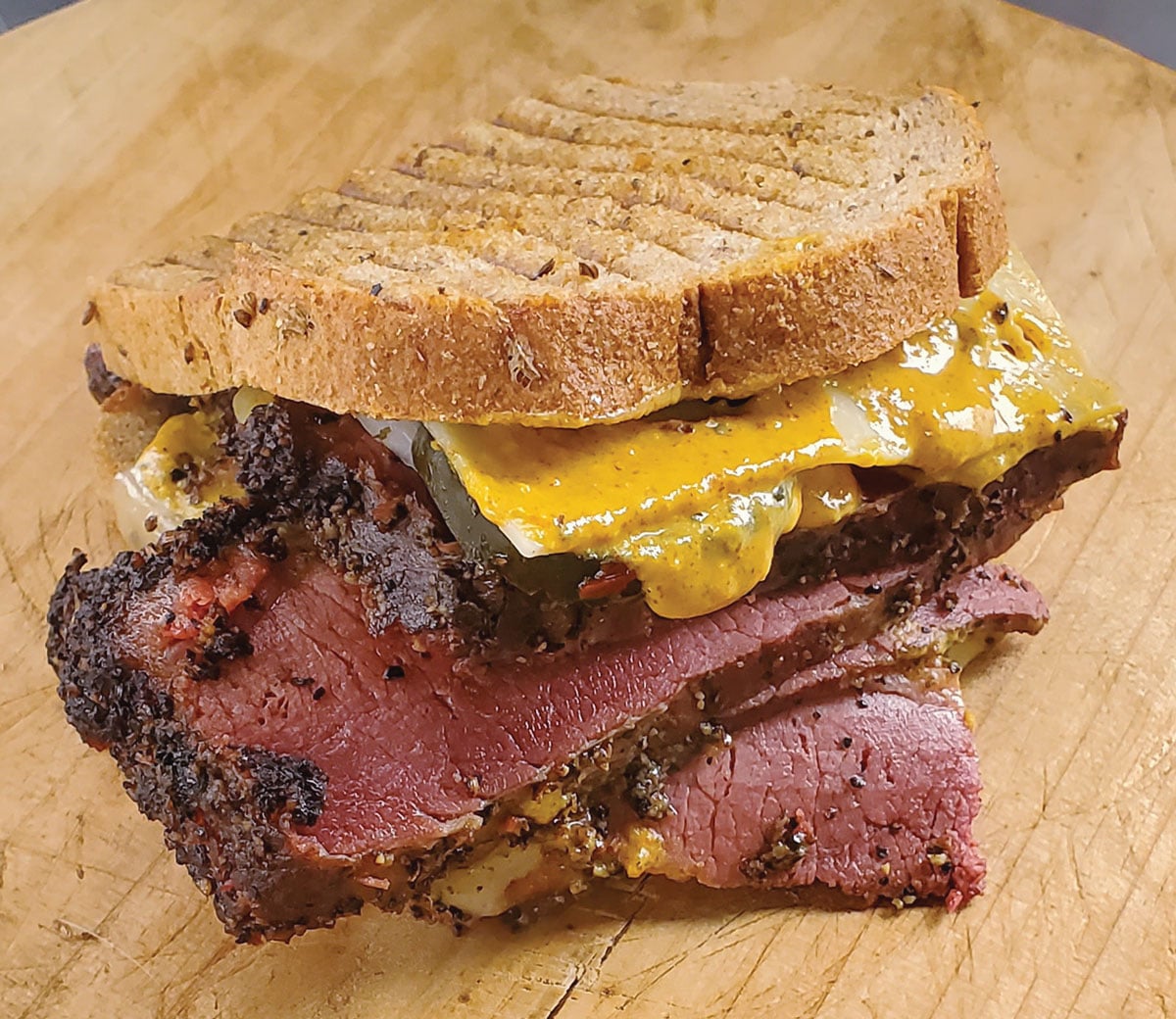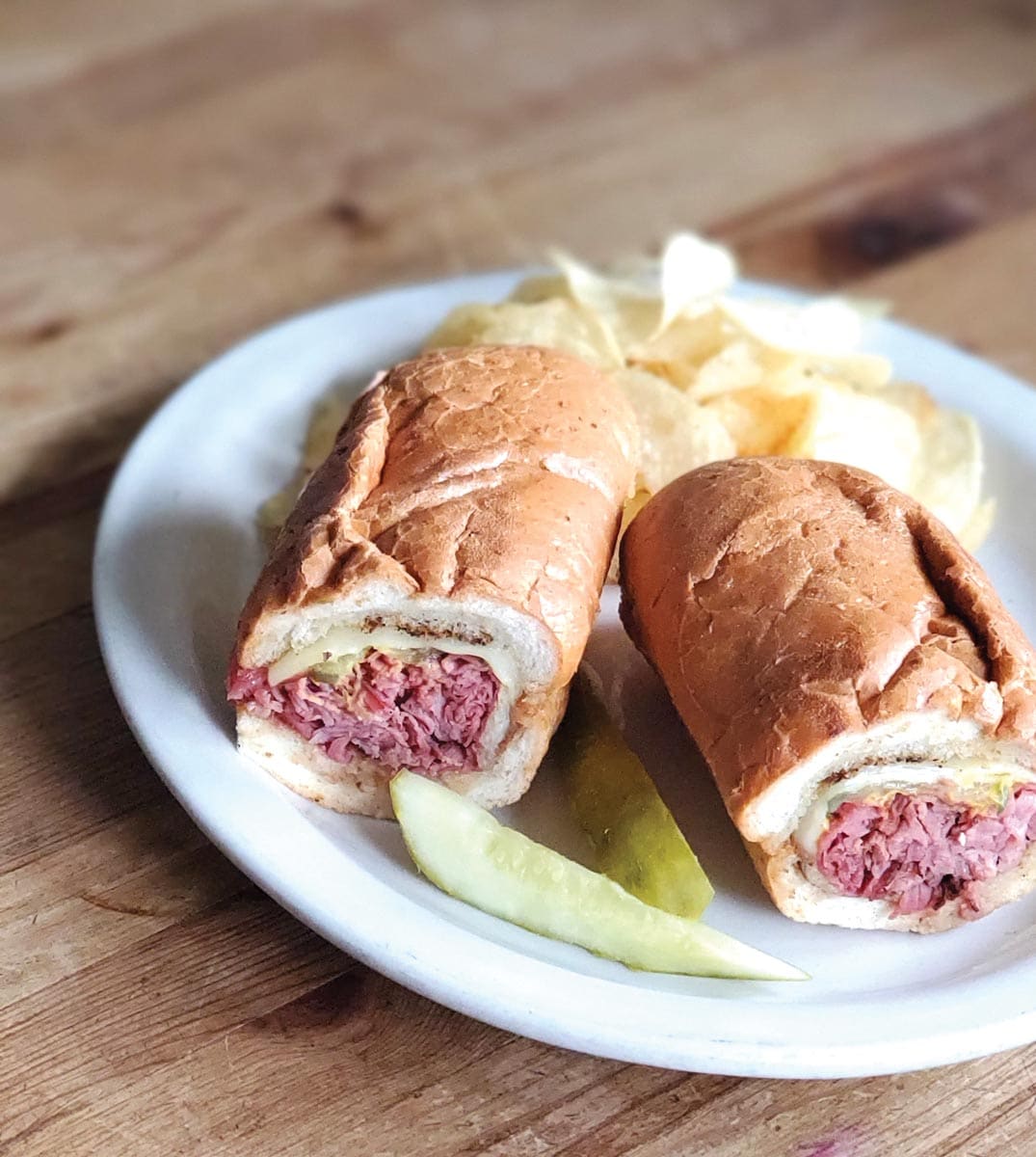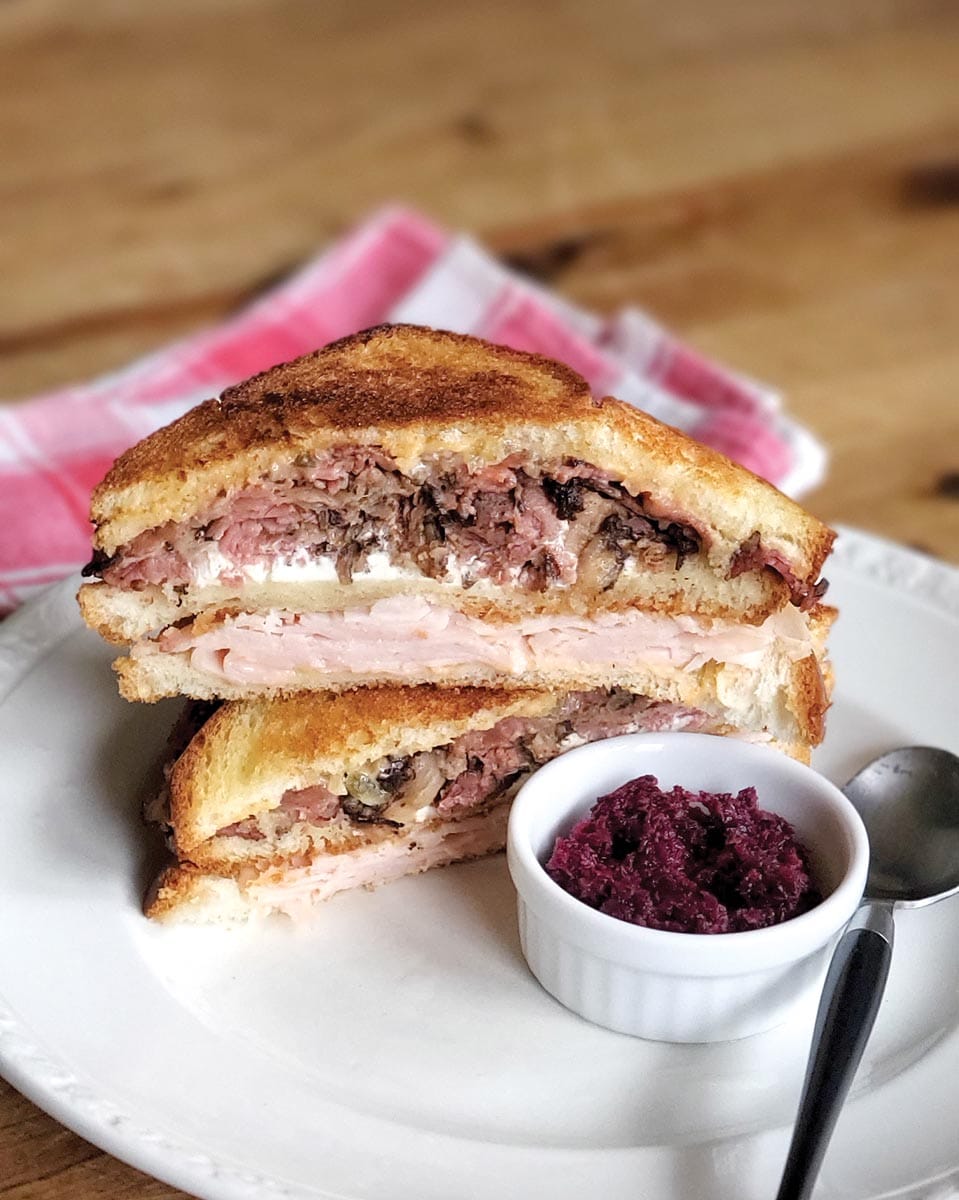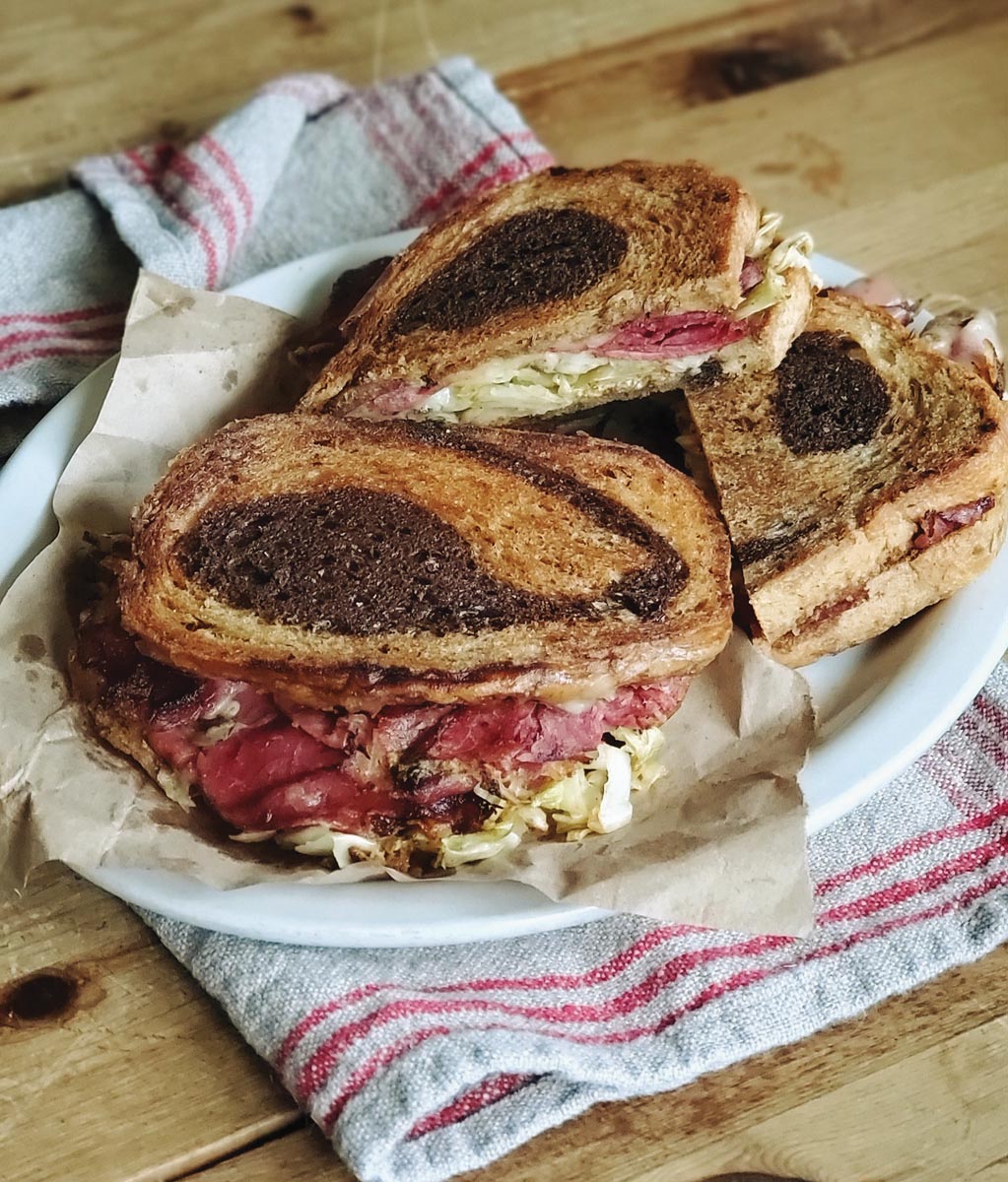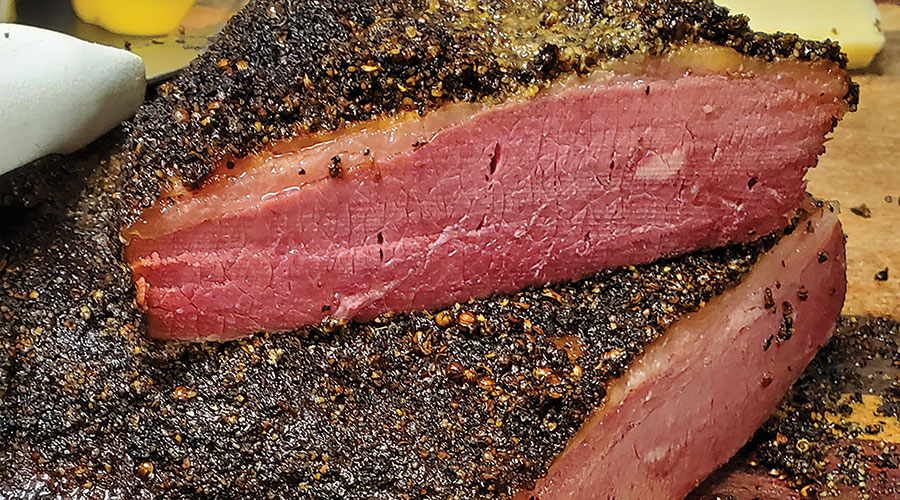
Pastrami, Please
It’s what corned beef wishes it could be.
By June Naylor
Photos by Meda Kessler
A little smoke and magic from Panther City BBQ makes this pastrami special
The day Chris Magallanes posted his first social media photo of the pastrami he and cohort Ernest Morales are serving at their Panther City BBQ, our new obsession was born. We’ve always enjoyed pastrami — it’s a magically tender beef rendition offering a perfect balance of tangy, peppery flavors — but we’d never seen it look so darned sexy before. The Fort Worth pitmasters took their version to new heights thanks to the thick slices they cut for serving.
We wondered, as exceptional as this is, why don’t we see smokehouse pastrami more often? Turns out, it’s not an easy process, says Daniel Vaughn, Texas Monthly’s esteemed barbecue editor.
“This Texas style of pastrami, done with whole briskets, is more involved than smoking brisket. It’s a big challenge if you don’t have a lot of cooler space, which you need for the wet brining,” Vaughn explains, noting that several smokehouses south of here do the work, as does Cattleack Barbeque in Dallas. “What’s so good is that this kind of pastrami, because it’s cured, is good the next day, unlike a lot of other barbecue.”
Panther City’s approach demands a high degree of commitment. First, Magallanes and Morales brine their prime brisket for up to two weeks, then work in a dry rub of pepper, coriander and a few other seasonings before smoking it for about 13 hours over post oak. Which explains why it’s only offered once a week, typically on Thursday.
“We tried it first after tasting the pastrami from our good friends at Roegels Barbecue Co. in Houston,” Magallanes says. “We shelved the idea for some time because we wanted to do it justice. After coaching from Russell Roegels, we gave it another shot, and it’s proven popular.”
That’s true, to say the least. It’s typically sold out by 2 p.m., with a run on both sandwiches and by-the-pound sales. For our money, the mound of pastrami (a tiny bit fatty, the way we love it) layered with just-melting Swiss, pickles, onion slices and housemade habanero-brown mustard on rye from nearby Great Harvest Bread Co. is a steal at $10.50.
Note: One sandwich easily feeds two, especially if you get Panther City’s spicy vinegar slaw on the side, a must in our opinion.
This pastrami reverie led us to consider others out there — and we realized another chef in town is successfully turning out his own distinctive version. We also revisited two longtime favorite delis where the tried-and-true sandwiches remain as good as ever.
Panther City BBQ 201 E. Hattie St., Fort Worth, 682-499-5618, panthercitybbq.com
Weinberger’s Deli Why stop at a pastrami and rye when you can experiment with layers of flavors
When Dan Weinberger opened his shop in Grapevine in 2002, he brought a half-century of family deli experience with him from Chicago. Known for a solid and expansive sandwich menu, the eatery prides itself on a significant selection of pastrami creations. Weinberger drew inspiration from favorites he found over the years, such as the Lustig, a New Jersey-style sandwich combining hot pastrami with cold turkey pastrami, melted Swiss, creamy coleslaw and Russian dressing on grilled black bread — altogether pleasantly sweet. The super-tart California pastrami sandwich was suggested by a customer from the West Coast; its combination of hot pastrami and Swiss takes on a perky personality with sliced pickles, yellow mustard and giardiniera peppers, all mounded on grilled baguette. But the owner’s personal favorite, named for an Episcopal priest who frequented the family’s Chicago deli, is the Father Dolan. Pastrami, corned beef and turkey pastrami are grilled together, with Swiss cheese melted atop the meat stack, finished off with lettuce, tomato, red onion, Russian dressing and a special pickled pepper blend of giardiniera. The layered creation is served on a garlic-grilled poppy seed hoagie roll. Weinberger says, “I like the mixed meats; the turkey and corned beef have a tendency to fade but the pastrami has that edge that helps it all hang on. And the giardiniera is hot but nicely tempered by the dressing and cheese.”
Weinberger’s Deli 601 S. Main St., Grapevine, 817-416-5577, weinbergersdeli.com
We’ll always be faithful to the Rebecca at Carshon’s Deli
Open since 1928 and the city’s only kosher-style delicatessen, Carshon’s is our go-to for matzo ball soup, a bagel with lox or pickled herring, chicken liver on toast and owner Mary Swift’s phenomenal pies, served warm from the oven. Swift and her team also sell a whole lot of sandwiches stuffed with meats freshly sliced in the old-school fashion. The pastrami — she buys what’s called the navel cut, known for juicy marbling — is Swift’s favorite, thanks to its peppery edge. We head there regularly for the Rebecca, a triple-decker sandwich with layers of pastrami, turkey, cream cheese and Russian dressing on grilled egg bread. “We made up the Rebecca probably about 35 years ago,” recalls Swift, “to offer another good combination of flavors. Some people just ask for ‘the one with cream cheese.’ ” The sweet dressing and mellow cream cheese prove able foils for the tart pastrami, with the tender turkey as a bonus. Ask for a little burgundy-hued beet horseradish on the side to add a sweet-hot pop to your sandwich.
Carshon’s Deli 3133 Cleburne Road, Fort Worth, 817-923-1907, carshonsdeli.com
The Reuben and all the chef-made trimmings at Wild Acre give us a lot to love
At the brewery’s gastropub outpost on Fort Worth’s Westside, chef David Hollister serves artfully crafted sandwiches that pair nicely with a robust menu of craft beers. His Reuben will satisfy a big appetite and is built around Akaushi wagyu eye round that he pickles for six days in a proprietary brine (heavy on the cardamom) and coats in his own rub. It’s oven-roasted for several hours, then sliced for serving with Gruyere cheese and a little pile of coarsely cut sauerkraut that Hollister ferments in-house with caraway seed and sea salt. Sambal-infused Thousand Island dressing is spread atop the assemblage on marbled rye, which is doused with garlic-clarified butter and grilled. Split this with someone and order a side cup of beer-infused piquillo pepper-smoked Gouda soup.
Wild Acre 6473 Camp Bowie Blvd., Fort Worth, 817-353-2074, facebook.com/WildAcreCampBowie
THE MEATY FACTS ABOUT PASTRAMI
Pastrami has its origins in Romanian pastrama or Turkish pastirma — or maybe the dried meats of both cultures. Some argue that the name is a Yiddish contraction of salami and pastirma.
American deli pastrami is usually made from a deckle — shoulder — cut or a navel cut, the slightly fatty (juicier and tastier) area just below the ribs.
Brisket has always been used to make corned beef, which originated in Ireland. Pastrami made from brisket is a more recent innovation that pitmasters — and Texans — love. Both pastrami and corned beef are brined meats, but corned beef is unseasoned and boiled (yawn), while pastrami is intensely seasoned, smoked and steamed. Add post oak wood smoke, and you have truly gilded the lily.
A traditional pastrami seasoning blend includes pepper, coriander, mustard seeds, fennel seeds and fresh garlic, giving the meat its signature black rind.
Pastrami typically is low in fat (even the moist cuts) and lower in salt than corned beef. Serve it up on rye, a whole grain bread, and — unless you pile on cheese (we won’t judge) — you won’t kill your diet.
Acceptable condiments include mustard, Russian or Thousand Island dressing, pickles and sauerkraut. For cheese, Swiss is the traditional way to go, but feel free to break the rules.
— Meda Kessler and Babs Rodriguez

